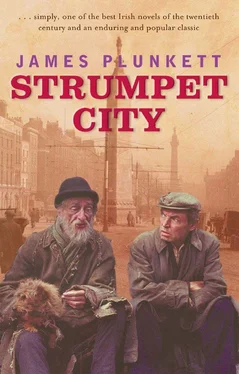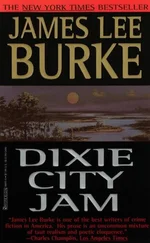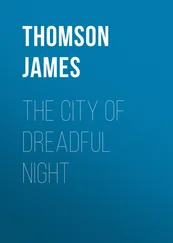‘You can say a little prayer for me.’
‘They were my mother’s. I’d rather lose anything than these.’
Miss Gilchrist lay still, taking in his happiness, smiling in sympathy with it.
‘God bless you,’ he said. On an impulse he placed his hand lightly on her head and murmured his formal blessing. She closed her eyes and barely opened them when he bid her good night.
‘What do you make of her?’ Bradshaw asked.
He had made a point of meeting the priest in the hallway.
‘I think she should be all right,’ Father O’Connor said. Priests, he knew, had the reputation of being good judges, but as yet he had had very little experience of the sick-room.
‘Can you step in here a moment,’ Bradshaw invited. He held open the door of the drawing-room. They sat down.
‘The doctor,’ Bradshaw began, ‘thinks it may have been a little . . . stroke.’
They always said little, Father O’Connor thought, remembering the old woman’s closed eyes and tired face. It was a little weakness, a little turn, a little upset.
‘The trouble is,’ Bradshaw continued carefully, ‘that it seems to have affected one of the legs.’
‘In what way?’ the priest asked.
‘Paralysis—at least partial. Of course, it may pass.’
‘Please God it will.’
‘On the other hand it may not.’ Bradshaw fixed his gaze on the far corner. ‘What are we to do if she is no longer able to work?’
He waited for the priest to answer. Father O’Connor, drawn suddenly into the problem by the use of the word ‘we’, felt he should answer that the Christian thing would be to look after the old woman. But no matter how he tried to formulate the sentence it sounded incredibly impracticable. He decided to play for time and, if possible, to put forward his view obliquely.
‘She has been a very long time in service with you,’ he began.
‘She’s been paid for her trouble, every penny.’
‘Of course. It was not my intention . . .’
‘And been treated with every consideration.’
‘I have personal evidence of that,’ Father O’Connor said, in a conciliatory voice.
‘Indeed, if Mrs. Bradshaw has a shortcoming, it is her indulgent nature, as I have bitter cause to know.’
Father O’Connor, intimidated by Bradshaw’s commanding tone, nodded his head.
‘It’s not that I mind her growing old,’ Bradshaw continued, ‘provided she can potter around and get her work done. But what if she is incapable? We can’t employ a servant to dance attendance on a servant. The thing would be absurd.’
‘Has she no relatives?’
‘None at all.’
‘That makes it very difficult,’ Father O’Connor found himself saying.
‘And worrying, very worrying,’ Bradshaw added. He sighed deeply, thinking that he was never quite free from ill fortune; troubles trailed him everywhere like kittens after a cat.
‘God knows I’m fond of the old woman, she is quite devoted,’ Bradshaw continued. ‘If she remains as she is and we have to part with her it will be a terrible upset.’
Father O’Connor wanted to speak for her. The suggestion that she should be kept in the house no matter what the outcome of her illness came several times to the tip of his tongue. He could not say it. He told himself it would do no good. It would only make Bradshaw regard him as an incorrigible fool.
‘We can only pray,’ Father O’Connor said. ‘Prayer works wonders.’
The dilemma haunted him as he walked home. It seemed insoluble. If the old lady remained incapable, only Bradshaw’s generosity would stand between her and the workhouse; and Bradshaw, Father O’Connor knew, was incapable of charity in so large a measure. Indeed, Father O’Connor reminded himself, God did not demand it of his children. And yet, given certain circumstances, was not something required, in all justice, over and above the meticulous discharge of a contract? St. Thomas had somewhere discussed the matter. Father O’Connor tried but failed to remember specifically.
The streets were deserted, the bulk of the church looked black and forbidding, the wind was cold and burdened with rain. Father O’Connor went through the side gate and heard it groan as it shut behind him. What he could have said on the old woman’s behalf he did not know. He only knew that he had not said it. He walked along the narrow, tree-lined approach, his shoulders hunched, feeling like Judas.
‘What time is it?’ Miss Gilchrist asked.
‘Almost midnight.’
‘You should get to your bed.’
‘Presently,’ Mary said, ‘when you’ve had your milk and settled down for the night.’
The wind was making a great noise outside, bullying the trees and driving the rain against the windows. Sometimes the lamp dimmed and then brightened again, sometimes a gust beat down on the fire and sent a puff of smoke into the room. Mary watched the saucepan of milk, which for convenience she was heating at the bedroom fire. Miss Gilchrist returned to her chosen topic, Father O’Connor’s visit.
‘Did he say anything to you?’
‘About what?’
‘About your trouble.’
That was the phrase she had found for Mary’s loss of favour.
‘Not a word. Perhaps he didn’t know.’
‘Nonsense,’ Miss Gilchrist said, ‘of course he knew.’ She lay staring at the ceiling, a whitewashed one on which the beaded lampshade cast restless patterns. They were faces, flowers, animal shapes.
‘He’s kind. If you’d mentioned it to him he would have put in a word with the boss about you.’
‘I don’t want him to.’
‘But what will you do?’
Mary did not know as yet. First she must see Fitz. The milk bubbled around the edges and she took it away from the fire. Fixing Miss Gilchrist’s pillows, Mary sat down at the bedside and they both drank. The room was cosy, yet in some subtle way it had changed. It was no longer a place in which she was accepted and approved. The furniture, the sick-room utensils, Miss Gilchrist’s rebel, were no longer part of her life. They surrounded her like enemies. She had a home no longer. Even outside the house everything had changed. At mass on Sundays she saw people she knew and thought they looked strangely at her. It made her hate them and brought her several times to the verge of tears.
‘What can I do?’ she said at length. Except get away. That meant home. She would feel unwanted at home too. And neighbours would gossip in the small townland.
‘Father O’Connor is the man to go to,’ Miss Gilchrist said again, just before Mary settled the clothes about her and she began to fall asleep. ‘He won’t let you down.’
Mary turned down the lamp. The clock said midnight. She took the glasses and left on tiptoe, pausing for a moment on the stairs to assure herself that the house was sleeping. It was hard to unbolt the kitchen door without making a noise, but she succeeded at last. She closed it behind her, hoping the latch, which often slipped, would hold against the wind. The cold sting of the rain made her catch her breath as she hurried down the length of the garden. She opened the garden gate and stared into the darkness. Coming from the lighted house made it impossible to see anything. She started with fright when Fitz stood suddenly close to her.
‘Mary,’ he said.
She turned to him and he folded her tightly in his arms. After a moment she said: ‘Not here. Come inside.’
They went up the garden together until they found cover under a tree. It was no longer much protection against the driving rain, but it held off the wind a little and hid them from the roadway. Fitz took her in his arms again and she said: ‘My darling, I kept you waiting, and you’re soaked.’
‘It doesn’t matter,’ Fitz said.
Читать дальше












